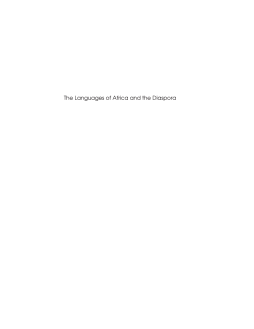
Additional Information
Book Details
Abstract
This book examines the social cost of linguistic exceptionalism for the education of speakers of nondominant/subordinated languages in Africa and the African diaspora. The contributors take the languages of Africa, the Caribbean, and the US as cases in point to illustrate the effects of exceptionalist beliefs that these languages are inadequate for instructional purposes. They describe contravening movements toward various forms of linguistic diversity both inside and outside of school settings across these regions. Different theoretical lenses and a range of empirical data are brought to bear on investigating the role of these languages in educational policies and practices. Collectively, the chapters in this volume make the case for a comprehensive language awareness to remedy the myths of linguistic exceptionalism and to advance the affirmative dimensions of linguistic diversity.
Jo Anne Kleifgen is Professor Emeritus of Linguistics and Education, Teachers College, Columbia University, USA. Her publications include Educating Emergent Bilinguals: Policies, Programs, and Practices for English Language Learners (with Ofelia García; Teachers College Press, 2010) and Languages of Africa and the Diaspora: Educating for Language Awareness (with George C. Bond; Multilingual Matters, 2009).
George Clement Bond is the Director of the Center for African Education and William F. Russell Professor for Anthropology and Education at Teachers College, Columbia University. His interests include education and elite formation in the United States and Africa, African studies, African religions and politics, agrarian transformations and cultural dimensions of urban and minority populations.
This is a rich collection of generally convergent, stimulating takes on the “Creole Exceptionalism” thesis. Extending it to African languages and African American English, most of the authors show the disastrous consequences of underrating and marginalizing these vernaculars in school. Other contributors apply the thesis to the profiling of African Americans, making it obvious that attitudes to these varieties reflect social prejudice toward their speakers. Still others show how a better understanding of structural and stylistic peculiarities of these vernaculars can be used profitably in education and the promotion of their speakers. Sadly, both contemporary Black Africa and its Diaspora still suffer from the European colonization’s legacy of devaluating the languages and manners of the subjugated populations, thereby disenfranchising them!
Salikoko S. Mufwene, The Frank J. McLoraine Distinguished Service Professor of Linguistics and the College, University of Chicago.
This deeply informed and solidly grounded inquiry provides an illuminating perspective into the nature, variety, and social and cultural setting of languages of Africa and the diaspora, and implications for instruction and language policy. A very valuable contribution.
This is a remarkable collection of articles that make a unique and important contribution to scholarship on language, learning, and linguistic diversity in Africa and the diaspora. Key researchers in the field address an exciting range of topics, from language policy and community libraries, to African American English and Creole as a regional language. It will be of great interest to applied linguists, language educators, and language planners.
Table of Contents
| Section Title | Page | Action | Price |
|---|---|---|---|
| Contents | v | ||
| Acknowledgements | vii | ||
| Contributors | ix | ||
| Chapter 1 Discourses of Linguistic Exceptionalism and Linguistic Diversity in Education | 1 | ||
| Part 1 Language and Education in Africa | 23 | ||
| Introduction | 25 | ||
| Chapter 2 African Perspectives on Linguistic Diversity: Implications for Language Policy and Education | 32 | ||
| Chapter 3 Language in Education in Africa: Can Monolingual Policies Work in Multilingual Societies? | 48 | ||
| Chapter 4 Perspectives, Challenges and Prospects of African Languages in Education: A Case Study of Kiswahili in Tanzania | 64 | ||
| Chapter 5 Languages, Literacies and Libraries: A View from Africa | 80 | ||
| Chapter 6 Street Setswana vs. School Setswana: Language Policies and the Forging of Identities in South African Classrooms | 96 | ||
| Part 2 Language and Education in the Diaspora | 117 | ||
| Introduction | 119 | ||
| Chapter 7 Creole Exceptionalism and the (Mis)Education of the Creole Speaker | 124 | ||
| Chapter 8 Political and Cultural Dimensions of Creole as a Regional Language in the French Antilles | 145 | ||
| Chapter 9 Success or Failure? Language, Tracking and Social Stratification of Anglophone Caribbean Students | 162 | ||
| Chapter 10 Sierra Leonean and Liberian Students in ESL Programs in the US: The Role of Creole English | 178 | ||
| Chapter 11 Continued Marginalization: The Social Cost of Exceptionalism for African Refugee Learners of English | 199 | ||
| Chapter 12 Linguistic Profiling, Education and the Law within and beyond the African Diaspora | 214 | ||
| Chapter 13 On Shallow Grammar: African American English and the Critique of Exceptionalism | 231 | ||
| Chapter 14 African American English and the Public Interest | 249 | ||
| Chapter 15 Rockin' the Classroom: Using Hip Hop as an Educational Tool | 270 | ||
| Index | 287 |
